
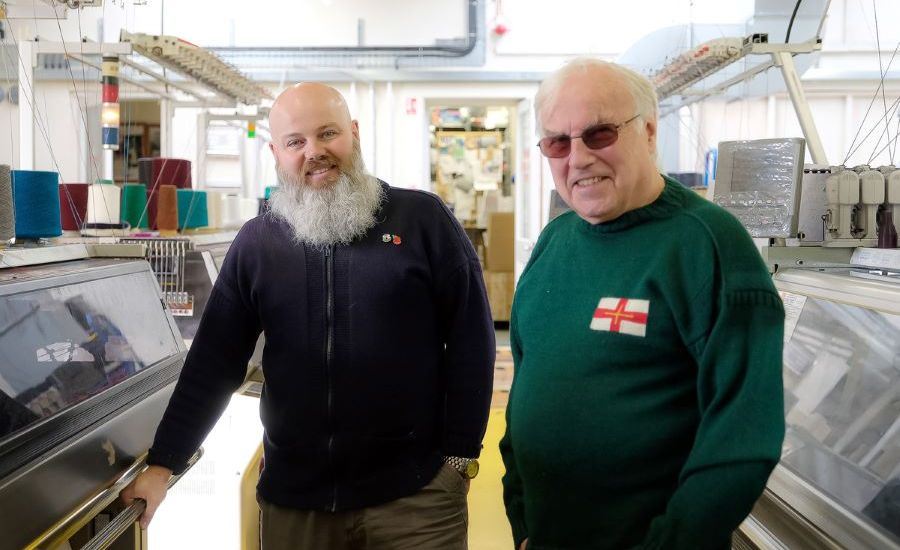

After more than 60 years building successful businesses in the textile industry, and now in his late 70s, Arthur Eldridge could be forgiven for taking it easy. “No chance,” he says. “I like my work. And I have a terrible admission, which is that I can’t survive without aggravation, and I like a scrap.”
So here he is, early one winter's morning, talking to me about Guernsey Woollens, the local firm he helped revitalise after moving to the island 15 years ago, and telling me enthusiastically about his typical 12-hour workdays and recent programme of investment of around half a million pounds in new equipment to secure the future of the business.
Arthur and his eldest son, Paul, who work alongside each other running Guernsey Woollens, and their team of up to eight full-time and casual staff, manufacture and export thousands of authentic guernseys every year to all four corners of the world: the UK, France, Sweden, the Netherlands, Chile, Japan and Korea, among others.
On the morning I was with them, a new order came in from the Czech Republic. Their customers include retailers, individuals ordering online, UK military regiments, chandleries, the RNLI, and locals and visitors buying at their workshop in Lowlands Road.
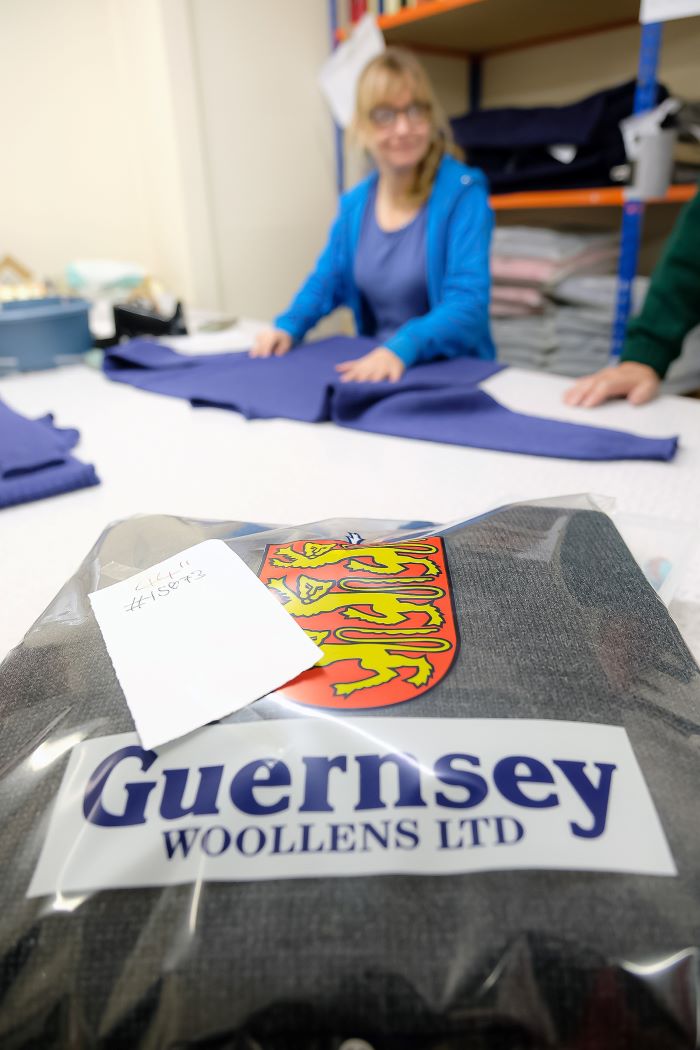
Pictured: Guernsey Woollens sends hundreds of guernseys and other related garments around the world every week.
Their largest markets are in the Far East, initially Japan and more recently Korea, both of which developed slightly unconventionally. “Somebody went into a shop in Notting Hill, saw a guernsey with one of our labels, jumped on a plane and came over here to see us. That’s where Japan started for us. There’s a company called Watanabe which has fabulous shops all over Japan and our guernseys with our label are in them,” says Arthur.
“Where Korea started was with a phone call from a woman over there asking me what we supplied and our minimum order. We started a business relationship around four years ago and it’s now worth about £350,000 a year.” Guernsey Woollens is dispatching around 200 guernseys a week to Korea. “We only deal with that one business in Korea. So popular has our label become that they now have other garments made which carry a Guernsey Woollens label – like woven trousers and all sorts of other things. It’s run by a brilliant married couple. They’ve been over here a couple of times and we’ve met them in Paris and Florida.
“There are very often fashion elements to guernseys. The guernseys for Korea always have an anchor on the sleeve and longer sleeves with thumb holes. The Japanese order them with stripes here and there.”
Guernsey Woollens also manufacture the same guernsey material in crew necks, cardigans and quarter zip jumpers, the guernsey-style jumper but in cotton, and other items, intriguingly now including a highly effective draught excluder made out of guernseys which Guernsey Electricity is using to help a handful of customers in less well insulated homes. But the traditional, iconic guernsey remains the company’s signature garment.
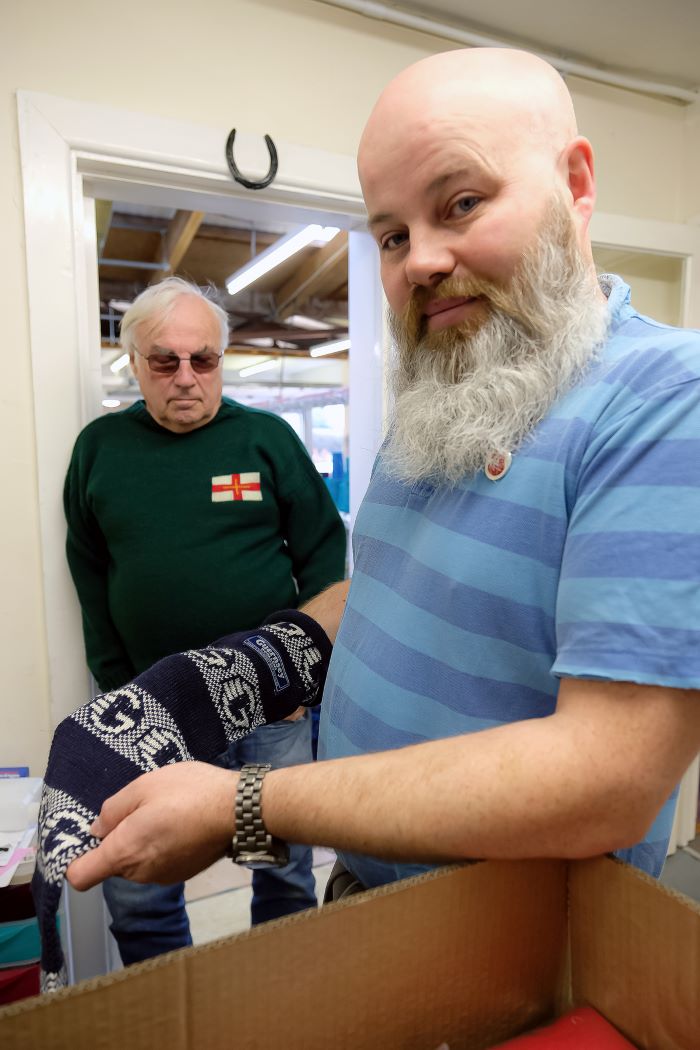
Pictured: Paul came up with the idea of making draught excluders out of material traditionally used to make guernseys.
Its machines – of which four have been purchased in recent years, each at a cost of around £100,000 – make seamless guernseys, “as it was done in the old days,” says Arthur. “If we had this much work on, but without the machines, we’d need to employ 20-odd people. We’re producing at capacity with the way we currently work.
“But we were at capacity before I bought two new machines earlier this year, so that’s made a difference. Whether we could squeeze in another machine, I don’t know. We could run two shifts and the machines for 16 hours a day – in theory, that is a possibility.”
While technology now makes the large part of hundreds of guernseys and other garments every week, each one is still hand-finished by Arthur’s staff, half a dozen of whom are working in a separate room while we speak near the unmistakable sound of the knitting machines. Some staff are putting the finishing touches to guernseys; others are packing mail orders, as far as they can into reusable or recyclable packaging.
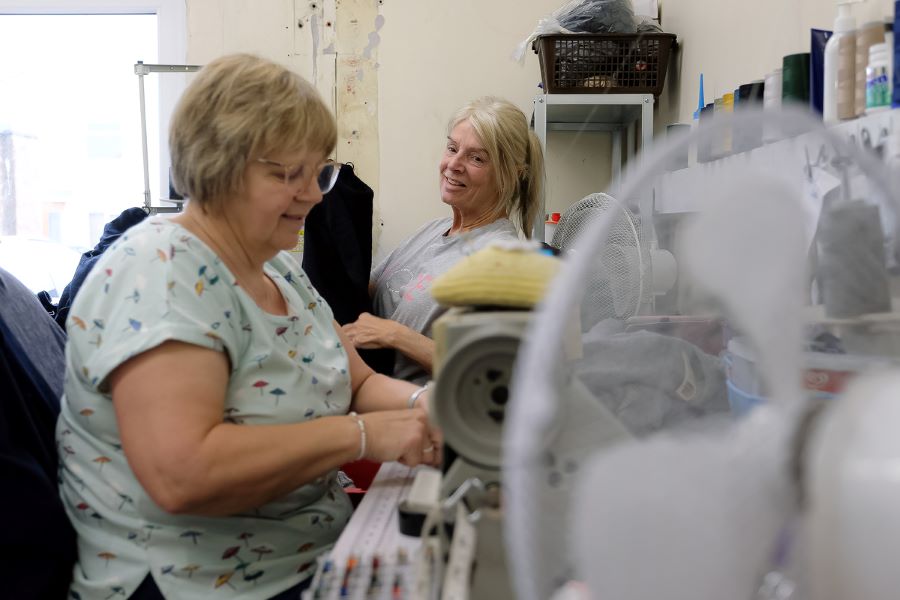
Pictured: Staff at Guernsey Woollens hand-finish each guernsey.
Guernsey Woollens has a proud history, pre-dating Arthur’s involvement. Founded in the 1970s, he says that at one time it employed 60-odd people. For much of its life, the company was owned by Phil Walker, who got Arthur involved when the latter relocated to Guernsey in the mid-2000s.
“I was thinking about packing it in [the textiles business] when I came down here, but I quickly decided I wasn’t up for retiring. I had brought down a couple of machines with me just in case. Phil and I had a chat. They were finding business more difficult and by this time I think there were only three of them there. I put my two machines in for them to rent and they employed me on a freelance basis. They had to move from Pitronnerie Road and went down to the Vale [in Rue des Marais]. Phil decided to carry on and I carried on with him. The deal was that I put in my two machines and that got me half the company and that was agreed.”
Phil and Arthur ran the business together for several years before Arthur bought Phil’s 50% “about three Christmases ago”. The premises in Rue des Marais had seen better days, business was expanding, and so Arthur moved the operation to Lowlands Road.
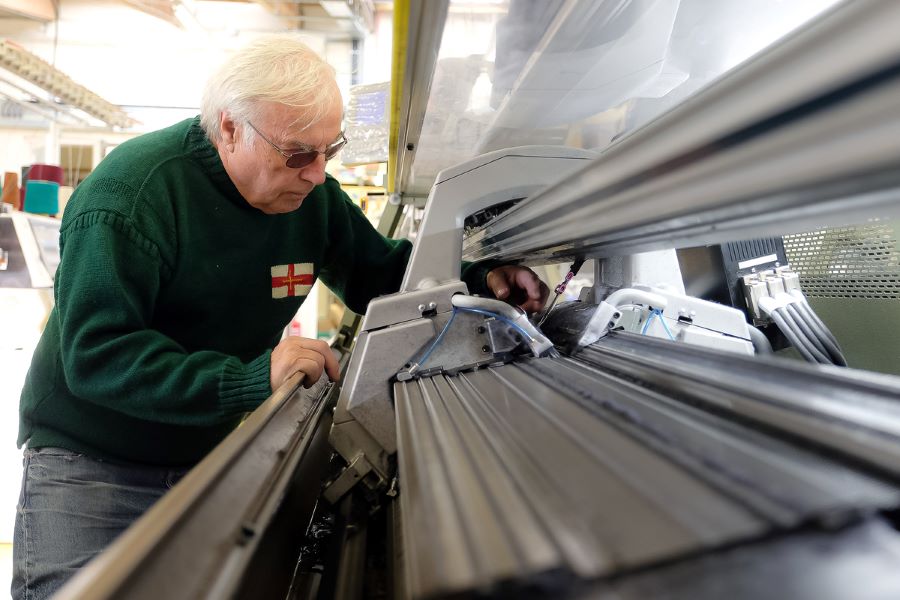
Pictured: Guernsey Woollens has invested hundreds of thousands of pounds in new equipment in recent years.
I first met Arthur, and Phil, while canvassing ahead of a general election, possibly in 2008. Four years later, Arthur was himself a candidate for people’s deputy, missing out on election in St. Martin’s by just 135 votes. Perhaps politics’ loss was industry’s gain in that Arthur, had he been elected to the States, might have lacked the time to lead the growth of Guernsey Woollens into what it is today.
In any event, he’s probably had a more enjoyable few years in the textile industry, where he tells me his heart has always been.
Born in Hinckley in Leicestershire, young Arthur failed his 11+ and, when offered the opportunity to secure a place at a Grammar School when he was 13, chose to remain at his secondary modern school “because from August until Christmas we did three weeks in each of the local industries…and I was so fascinated by the great knitting machines that I wanted to go that way and did that from Christmas until I left school, so when I went for a job I half knew what I was talking about.
“I worked for various people in the knitting industry, mainly turning designers’ nightmares into fabrics, and fixing machinery. I worked for several companies and then, at the age of 23, I went on my own freelancing worldwide, but more in Europe – Cyprus, Germany, Denmark – again turning designers’ whims and fancies into fabrics.”
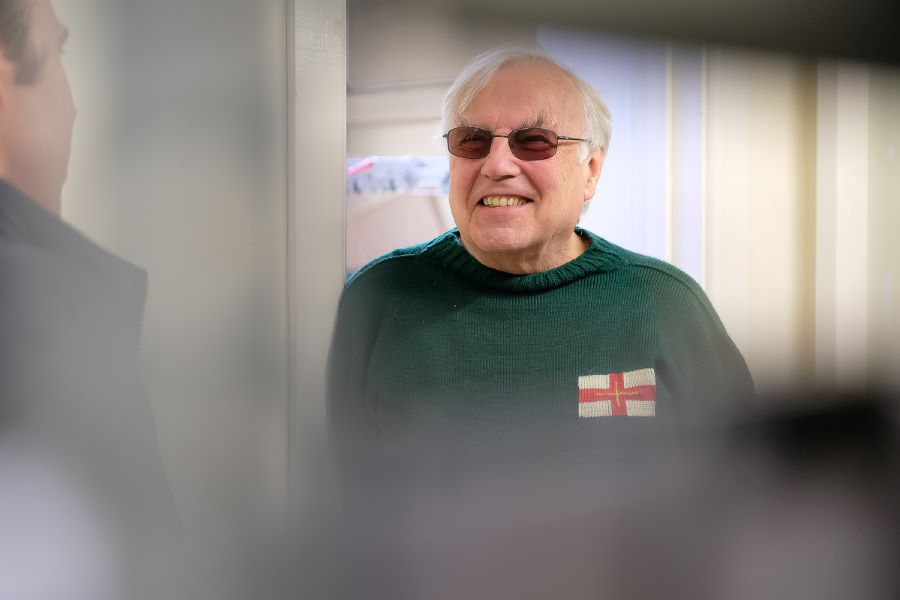
Pictured: Arthur has spent all his working life in the textiles industry, including running his own firm with over 100 employees in Leicestershire.
In the mid-1970s, Arthur bought into a company which he built into a significant operation. “In 1985, I sold the company to Next, but stayed on as Managing Director. The big difficulty I had was trying to figure out whether I was supposed to be making as much profit as possible as a satellite business or primarily running it as a sort of service to the mothership. That was a difficult time. Next then got themselves into trouble and wanted to get rid of some of their satellites, so in 1990 I bought the business back.”
Within a year, he had doubled the size of the company, ironically with Next as its largest customer. At the firm’s peak, Arthur employed around 120 people and contracted another 40 freelancers.
Recalling this period for a history of Hinckley, Arthur wrote that “the following 10 years were exceptional, with some lows but many highs”. In 1994, Princess Anne presented the company with an award for outstanding export achievement; in 1997, she visited Arthur’s factory and met his workforce. “We rode the crest of a wave for several years, but nothing is forever and, as time went by, it became more and more difficult to compete with China.
“The company shrunk from employing over 120 people to around 20 of us. Reluctantly, in 2005, I decided to close the company whilst I could pay all of the bills. The footprint where the company stood is now Knitters’ Close – a nice tribute, although it was a boot and shoe factory for a great deal longer than a knitwear one. The auctioneer came to me halfway through the thing and said: ‘I’ve just realised you haven’t gone bust – I’ve never done an auction for anyone that’s not gone bust’. Everyone was paid and off I went.” To Guernsey.
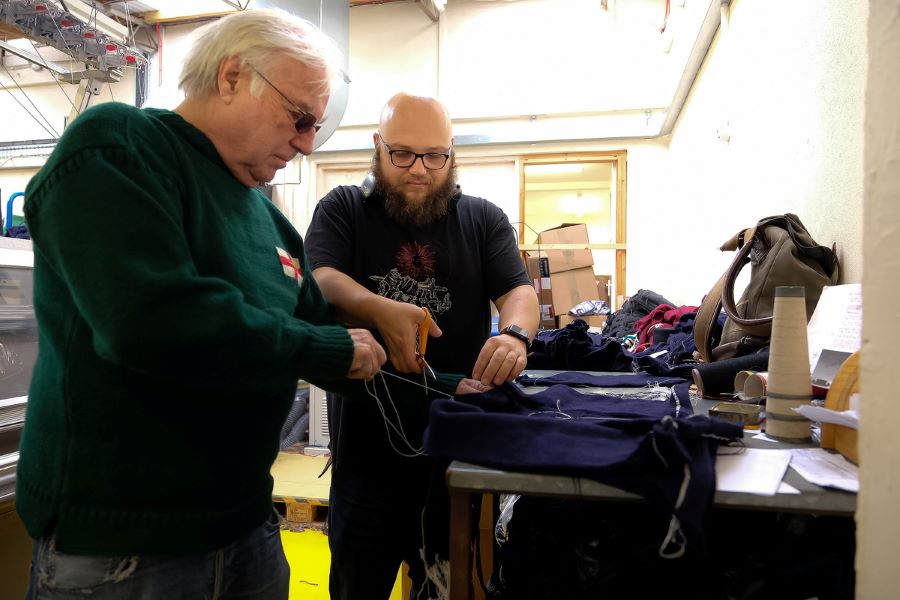
Pictured: Arthur relocated to Guernsey in the mid-2000s, potentially to retire, but he was soon working again, initially on a freelance basis for Guernsey Woollens before buying into the company.
A decade later, Paul followed his dad to the island. “When Paul left school, he worked for me for nine years in the UK. When it became obvious that we just could not compete with the Far East, he had to get out of it, and he became a paramedic and did very well at that. Paul has been down here for about six years now. He came down to work with me. We don’t always have the same ideas about everything.”
Arthur jokes that Paul “tends to consider my 62 years in the trade as not particularly relevant,” but more seriously says Paul, who now has a shareholding in Guernsey Woollens, “certainly has the skills to do it” if he wants to take over the company when – or perhaps if – Arthur ever retires.
Arthur has a daughter who may be following somewhat in her father’s footsteps: she is currently spending a year working for Nike in the Netherlands as part of a design degree at the University of Manchester. And he has four other sons.
“One, who was flying chinooks in Afghanistan, is now a British Airways pilot. We’re quite proud that Guernsey Woollens supplies the military. One has got his own business doing event management – he got a good job for the Commonwealth Games and got a glowing commendation which I think he could take anywhere if he wanted to. The next one is a doctor – he did his education in Guernsey and then went off to Sussex and Brighton. The next one got a first-class degree in engineering and is currently backpacking around New Zealand for a year.” He has three grandchildren, including one in Guernsey.
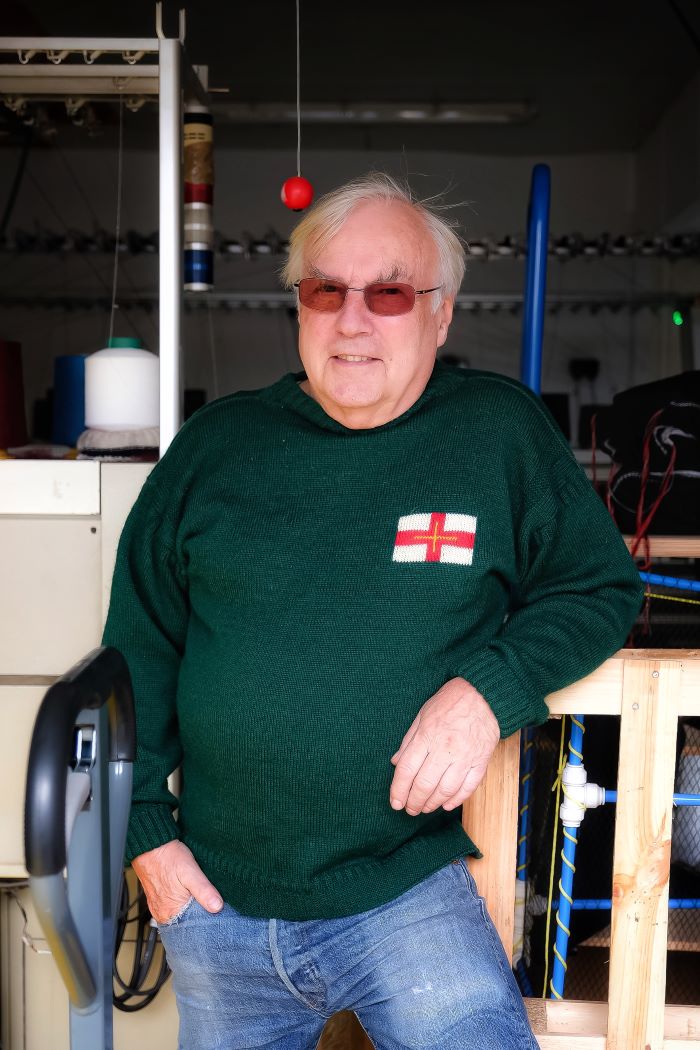
Pictured: Arthur remains majority shareholder but his eldest son, Paul, is now also a shareholder and they run Guernsey Woollens together.
Arthur has a couple of hobbies – flying and boating. “It seemed like there were loads of things I could do when I thought about retiring, but quickly I knew I’d miss the work,” he says. He agreed to become a director of a local flying training company, which he says “was losing money, but we’ve finally turned the thing around, so it’s a good time for me to go”.
Arthur’s work ethic can’t leave much time for recreation. “I’m in around 08:00 in the mornings. Yesterday was a typical 12-hour day. I work pretty much seven days a week. I tend not to be here all day on Saturdays and Sundays, but I’m in on those days – you know, start the machines going, leave, come back to sort out the machines, that kind of thing.”
Having briefly and unsuccessfully contemplated retirement 15 years ago, Arthur seems not to be giving much thought to making a second attempt to slow down. His work demands would challenge many people half his age. His concluding words on that underline his stoical perspective on life and dry sense of humour: “Hopefully one day someone will just switch my lights off and that’ll be it,” he says.
Pictured (top l to r): Paul and Arthur Eldridge, who run Guernsey Woollens in Lowlands Road.
Pictures by Paul Chambers.
CONNECT: 40 years on from hatching an export success story...
CONNECT interview: Building for the Future of Primary Care
CONNECT interview: Meet the custodian of our island's heritage
CONNECT interview: The man behind the scenes at the KGV
FOCUS: A Life in Light and Darkness
FOCUS: Work-life balance is next challenge for PR expert
Comments
Comments on this story express the views of the commentator only, not Bailiwick Publishing. We are unable to guarantee the accuracy of any of those comments.